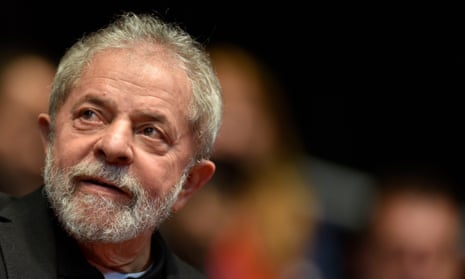Brazilian police have questioned former president Luiz Inácio Lula da Silva after raiding his home and several associated buildings in a corruption investigation that appears to put the judiciary and the government on a collision course.
The three-hour detention of the Workers’ party politician – who is unquestionably the most influential figure in Brazil’s recent history – marks a controversial new phase of the Lava Jato (“carwash”) inquiry into bribery and kickback allegations involving the nation’s leading companies and dozens of congressmen.
In the short term, it sparked street scuffles between supporters and police. Longer term, it looks likely to raise the political temperature in a country already traumatised by economic recession, the Zika epidemic and an impeachment challenge against Lula’s successor, President Dilma Rousseff.
The Lava Jato investigation – easily the biggest in the country’s history – initially focused on corruption and money laundering at the oil company Petrobras but has since widened to include construction and brokerage firms.
Federal police launched the action against the former president – who is popularly known as Lula – early on Friday morning.

Federal police launched the action against Lula early on Friday morning with raids on his apartment in São Bernardo do Campo, the home of his son Fábio Luís, the Lula Institute, and addresses in Bahia and Rio de Janeiro.
Investigators accused Lula – and leaders of other parties – of having election campaigns financed by kickbacks and bribes channelled from inflated Petrobras contracts.
“This grand scheme was coordinated from the summit by leaders of political parties that formed the base of the federal government, especially the Workers party, the Progressive party and the Party of the Brazilian Democratic Movement, said a statement from the federal prosecutors office. “Former president and party leader Lula was ultimately responsible for the directors of Petrobras and was one of the main beneficiaries of the offences.”
The statement stressed that Lula – who was released later on Friday – was only under suspicion and that no final judgment had been made. But investigators vowed not to be cowed by high office.
“Within a republic, even illustrious and powerful people must be subject to judicial scrutiny when they are suspected of criminal activity, which is based, in this case, on dozens of testimonies and extensive documentary evidence. The former president deserves respect, because of the dignity of the office he held, but this does not mean he is immune to an investigation,” the prosecutors’ statement said.
According to local media, about 200 officers and 30 tax auditors were involved in this phase of the operation, which has been named Aletheia – meaning “truth of disclosure” in Greek. Police reportedly have 33 warrants for search and seizure and 11 warrants for the arrest of individuals wanted for questioning, including Lula, his wife, Marisa, his children Marcos Claudio, Fábio Luís, Sandro Luís, and Marlene Araújo, and the head of the Lula Institute, Paul Okamotto.
The warrants were granted by Judge Sérgio Moro in Curitiba, where the Lava Jato investigation is based.
The former president – who has recently indicated that he may stand again in 2018 – has denied the accusations against him, saying they are politically motivated. He has not been charged with a crime.
After his release, Lula angrily denied the accusations levelled against him. “If the police or prosecutors PF, the prosecutors find one-real worth of wrongdoing in my conduct, I don’t deserve to be in this party” he told supporters outside the Workers party headquarters in São Paulo.
The confrontation between the prosecutors and the government hit a higher pitch in the afternoon, when the president warned that investigators had gone beyond constitutional bounds.
”I express my full dissatisfaction with the fact that a former president of the Republic, who voluntarily provided information before the competent authorities on several occasions, is now subjected to an unnecessary coercive order to make a statement,” Rousseff wrote on the presidential blog.
The Lula Institute described the raids and detentions as an “affront to the country and the rule of law” and accused the Lava Jato prosecutors of an “arbitrary, illegal and unjustifiable” act. It denied all accusations of illegality and concealment of assets. Regarding the properties under scrutiny, it said Lula had never set foot in the apartment in Guaruja and that his friends owned the place in Atibaia that he visited on occasion.
The former president, it said, had been cooperating with the investigation so the coercive detention was unwarranted. In addition, it accused the judicial authorities involved of a crime in leaking secret bank data to the media.
“The only result of the violence unleashed today by the Task Force is to submit the former president to a public embarrassment. It is not Lula’s credibility, but that of Operation Lava Jato that is compromised when its leaders turn to a political target on the most fragile of pretexts,” the statement read.
